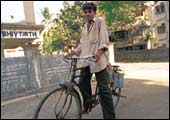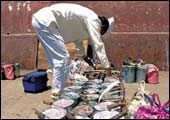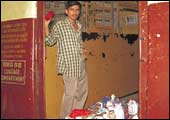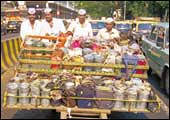 |
| 9.00 AM: Dabbawala starts pick-up
rounds |
 |
| 9.15 AM: Housewife hands over hubby tiffin
lunch |
 |
| 10.00 AM: Dabbas gathered, the
destination sorting starts |
 |
| 12.20 AM: Crate by crate, all sorted |
 |
| 11.30 AM: Loaded in bulk on local trains |
 |
| 11.30 AM: Unload and re-sort, on arrival
downtown |
 |
| 11.45 AM: Carted off to the disaggregation
points |
| |
| 12.25 PM: On its way to your desk |
Get your error rate down to one in
every 16 million transactions, and maybe even you'd be feted much
the same way. Management guru C.K. Prahalad would term you "an
incredible success story". The Confederation of Indian Industry
(CII) would invite you to be a special speaker at its Leadership
Summit. The Indian Institute of Management (IIM), Ahmedabad, would
invite you to make a presentation on your success to its students.
And Forbes magazine would glowingly describe yours as a Six-Sigma
operation.
But to be called the "soul of Mumbaikers", as Mumbai's
dabbawala system was called by the late columnist Behram Contractor
(to add to all the other honours), you would have to be more than
just a logistical success of clockwork efficiency. You'd have to
command awe. You'd have to push the pace of the city's pulse. You'd
have to demonstrate what could be done with no resources other than
precision planning, a few hundred handcarts, 4,500 dedicated workmen
(dabbawalas) and some 1,75,000 lunch boxes (the actual dabbas).
| ALL IN A BOX |
»
Delivers 1,75,000 meals/day
»
Covers over 60-70 km on Mumbai's suburban trains
»
Cost of service: Rs 150-300/month
»
People employed: about 4,500
»
Dabbawala groups Registered: 120
»
Annual turnover: about Rs 50 crore
»
Error level: One mistake in every 16 million transactions |
Network Buzz
What this network does, in a nutshell, is simple. It delivers
fresh home-cooked lunch from each of those 1.75 lakh homes to each
of the intended 1.75 lakh people's office desks-with individualised
accuracy, never a lunch switched for another. The service charge:
a mere Rs 150-300 per month.
Today, there are some 120 registered dabbawala groups in operation,
drawing an estimated Rs 50 crore in revenue. But the quality of
service remains consistent-a sign of how institutionalised the system
has become. The system, after all, has been around for 120 years.
And if Raghunath Medge, 47, President of the Dabbawala Association,
is to be believed, it's nowhere near the end of its lifecycle. The
service will stop, he says, if and only if Mumbai's trains stop.
Of course, the city's geographical pattern helps. Most of Mumbai's
office-goers live in the suburbs and work downtown, and there are
local trains connecting the two points-which form hubs for hub-and-spoke
sub-networks.
Work starts in the morning, with dabbawalas going door-to-door
in the suburbs, collecting the lunch packs, grouping them in stages
and strapping them into crates to be handcarted to the local station.
Here, the sorting process takes about 20 minutes, before the consignments
are loaded onto trains headed downtown. On arrival, the consignments
are sorted again and carted off in different directions for stage-by-stage
disaggregation and eventual delivery office-to-office. By 12.30,
your lunch pack is right there on your desk for you to dig in. Once
you're done, the pack is sent back in a precise reversal of the
process.
The entire system works on a military discipline based on a shared
agenda and a common protocol. The workforce, remember, is not even
educated to the secondary level. Each dabba bears a unique code
(like 'VLP E 3 9E12')-enough for any dabbawala to decipher. It is
a highly information-rich network, don't forget.
Corporate Role Model
No wonder the dabbawala system is a favourite among Indian academics.
Mangesh Korgaonker, Head of SJM School of Management, Indian Institute
of Technology (IIT), Mumbai, describes it as an error-free solution
to "a complex delivery problem". According to Pankaj Chandra,
Professor of Operations and Technology Management, IIM Ahmedabad,
it works on the principle of "centralised planning and decentralised
implementation", and owes its success to breaking "complexities
into small manageable entities that are linked together".
To Dhondi Sorgey, a dabbawala, however, it's a primary duty he's
doing-bringing 'anna' (rice) to people, for around Rs 4,500 a month.
The whole system operates as a loose cooperative, and with customer
satisfaction levels so high, there's little need for a rigid operating
structure. Bonus revenue is always welcome, though. A digestive
brand once used the dabbas as an advertising medium. That's innovation
enough for the system. A classic is a classic, you see.
|

